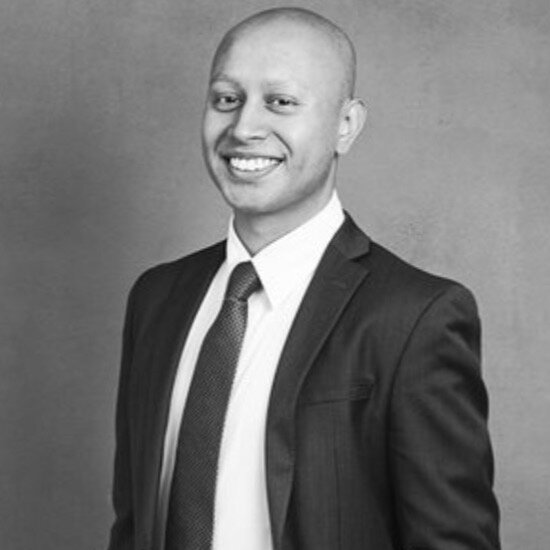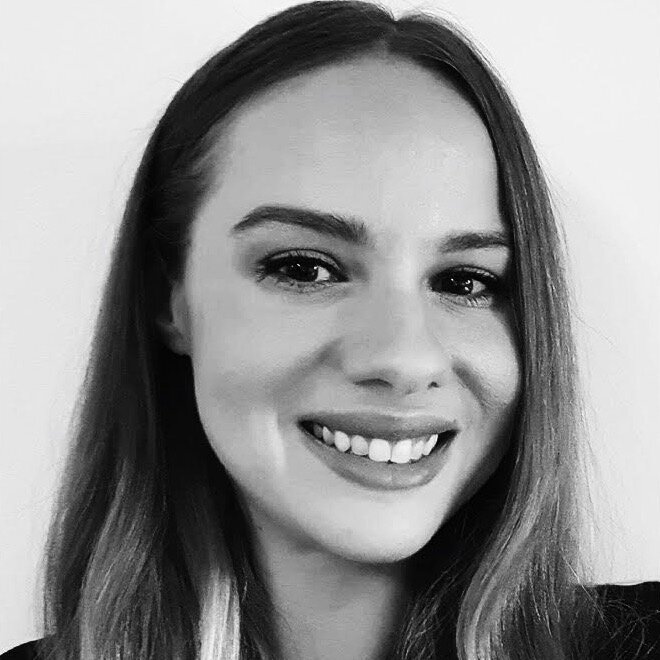Report a Violation: If you would like to report a violation of your human rights in a country of our focus (in the South Caucasus or Middle East) please send us a message providing details of how your rights were affected, by whom and when.
The Accountability Unit operates in non-hierarchical decentralised teams. Team members reciprocally contribute to all areas of our core work including management, legal, administrative, and partnership aspects of the NGO. Members’ substantive involvement in litigation or research is project by project and only select members will be involved with certain litigation. This multi-competency approach to our work facilitates team development, idea-sharing, effective collaboration, ownership and professionalism. Our current team members and their bios are provided below. Several members have chosen to remain off the website.
INDEPENDENT MEMBERS
AARIF ABRAHAM
Aarif specialises in international criminal law and public international law. He helped establish Accountability Unit and is a barrister at Doughty Street International.
He has previously worked in Chambers at the United Nations International Criminal Tribunal for the former Yugoslavia, Public International Law and Policy Group in Bosnia-Herzegovina, the European Court of Human Rights, the UK Court of Appeal, and the human rights team at UNAIDS/WHO among others. He originally qualified, and practised as a solicitor, at the international law firm Slaughter and May.
Aarif has advised individuals, companies, public interest groups and states in public law and human rights cases, both for claimants and respondents, as well as advising widely on policy issues. He has also advised policy makers, parliamentarians and practitioners widely on foreign policy and rule of law issues.
Aarif has authored and delivered high-profile advices, speeches and briefings on issues related to public international law and international criminal law. In the past year, this has included high-level briefings for the Bar Human Rights Committee, the International Bar Association’s Human Rights Institute, the United Nations and Parliamentarians on a number of issues.
Aarif has conducted litigation, advocacy, research and mentoring on international human rights and humanitarian law issues related to a number of countries and, in particular, work relating to gender-based rights. Aarif continues to act as a consultant on gender-based rights and conflict-related sexual violence.
TATYANA EATWELL
Tatyana is a barrister at Doughty Street Chambers with expertise in public international law, international humanitarian law, international criminal law and international human rights law.
Tatyana advises States, individuals, international and non-governmental organisations on a wide range of public international law and international human rights law issues. Her cases include matters concerning arbitrary detention, extra-judicial killing, war crimes and terrorism, sanctions, self-determination, and State responsibility. She has acted in high-profile criminal appeals before the UK Supreme Court that concern the interpretation of international law on, for example, war crimes, terrorism, and torture, and the application of international law in domestic proceedings.
Tatyana has a PhD in Public International Law from the University of Cambridge and an LL.M. in International Law from SOAS.
AYSE BINGOL DEMIR
Ayse Bingöl Demir is a lawyer specialising in international human rights law and domestic law and judicial procedures in Turkey. She is a graduate of the University of Istanbul in Law and Queen Mary University where she obtained a Master of Laws in Human Rights Law.
She practiced in Istanbul between 2003 and 2017. Her practice comprised bringing human rights cases before the domestic mechanisms as well as the European Court of Human Rights. The cases she worked on involved, among others, violations resulting from forced displacement of the Kurds in the 1990s, and systemic violations of the right to freedom of expression, due process rights, and minority rights.
She worked for the London-based Media Legal Defence Initiative from 2017 until 2019. She was a research fellow with Middlesex University School of Law between 2017 and 2020. Together with a group of academics and human rights lawyers, she founded the Turkey Human Rights Litigation Support Project, established through Middlesex University. She has been the Co-Director of the initiative since 2018 providing expertise and support to bring effective legal action to address the emerging human rights crisis in Turkey.
Ayse has published numerous articles on pressing human rights issues in Turkey and beyond. Currently based in New York, she continues to act as a consultant and country expert for several national and international civil society organisations.
GAIL LYTHGOE
Gail teaches and researches global law and governance at the University of Edinburgh, where she directs the new Global Law LL.B. Before joining Edinburgh Law School, Gail taught international law and international relations at the Universities of Manchester and St Andrews, respectively. Gail is Review Editor of the European Journal of International Law and is a member of the European Society of International Law’s (ESIL) Equality, Diversity, and Inclusion Advisory Body. Her research interests include global law, global governance, legal theory, and critical legal geography.
Gail worked with Accountability Unit over the past two years. She helped to review briefings series, convene lectures with colleagues under the auspices of Manchester International Law Centre, and contributed to our OUT-LINES in International Law Series including through the direction of podcasts. Gail, separately, is advancing a campaign relating to the Gender Parity Project at the International Court of Justice, and led a podcast on the same in collaboration with AU together with Dr Jessica Corsi of City University.
KEI HANNAH BRODERSEN
Hannah studied law and political sciences at the University of Erfurt (Germany) and the Moscow State Institute of International Relations (Russia) and obtained her LL.M. in European Law from Maastricht University, specialising in criminal law. She completed her PhD at Maastricht University, focusing on side-effects of international criminal courts and tribunals, most importantly on their impact on domestic criminal justice systems.
Hannah now works as a post-doc researcher at the Universities of Neuchâtel and Luxembourg in criminology and criminal law. She teaches comparative criminal law, international criminal law and international cooperation in criminal matters. Since 2015, she has also worked and taught on issues related to sexual and gender-based violence during armed conflicts.
Hannah previously worked at different international and governmental organisations, such as at the German Corporation for International Cooperation (Deutsche Gesellschaft für Internationale Zusammenarbeit, GIZ) which is responsible for implementing German development policies. Here, she assisted the Gender Focal Person of the corporation in supervising development aid projects in partner countries and putting into place a gender policy within the corporation. Hannah also worked as an assistant lawyer at the Council of Europe within the Directorate General for Human Rights and Rule of Law, monitoring national justice systems in terms of anti-corruption laws and policies.
SORAYA YASMINA BAUWENS
Soraya is a barrister at 1MCB Chambers, specialising in crime, international criminal law and international human rights. She has particular expertise in cases involving modern slavery and human trafficking, and is trained in the conduct of investigations on behalf of victims and survivors of torture and ill-treatment in line with the Istanbul Protocol.
Soraya has appeared frequently before various United Nations fora, expert panels at the UK and EU Parliament, and has guest lectured at Leiden University on counterterrorism and human rights. In addition to her busy criminal practice, Soraya frequently advises governments, organisations and victims of human rights abuses on domestic compliance with international law, as well as on treaty-based complaints mechanisms. She has a successful track record before the United Nations Working Group on Arbitrary Detention.
Soraya is trilingual in English, Arabic and French. She is a graduate of the School of Oriental and African Studies, the BPP Law School, the City of London Law School, as well as the University of Alexandria in Egypt.
SAFI VAN’T LAND
BENEDETTA LOCATELLI
Safi is a graduate of the Geneva Academy of International Humanitarian Law and Human Rights where she obtained an LL.M. and Master of Advanced Studies in International Humanitarian Law and Human Rights in 2015. Prior to specialising in this field, Safi obtained an LL.M. in Public International Law from the University of Leiden and an LL.B. in Law with Anthropology from the University of Sussex.
Prior to joining the Accountability Unit, Safi worked as an Assistant Legal Officer at the International Criminal Tribunal for the Former Yugoslavia and a research assistant for the Kalshoven-Gieskes Forum on International Humanitarian Law at Leiden University. She has also worked with a number of organisations seeking to provide access to justice and legal assistance to victims of human rights violations in Cambodia, Kenya and Nepal. In this context, she has conducted research on the available domestic and international legal avenues for victims of enforced disappearances, torture, and sexual and gender-based violence.
Safi is an editorial assistant for the Journal of International Humanitarian Legal Studies and provided similar legal research and editorial assistance to the International Review of the Red Cross during her studies at the Geneva Academy. Since September 2016, she is also the regional coordinator of the International Humanitarian Law Network of the Netherlands Red Cross - Amsterdam division, tasked with the coordination of volunteers and the organisation of various dissemination activities on behalf of the organisation.
Benedetta is an LL.B. Law graduate of the University of Manchester and an International Relations graduate of the Diplomatic Academy of Vienna. She is currently enrolled in an LL.M. in European and International Business Law at the University of Vienna.
At Accountability Unit, she is a junior legal assistant responsible for research, writing and communication.
During her academic years Benedetta volunteered for a number of projects, including for the investigation of miscarriages of justice at the Miscarriages of Justice Review Centre at the Justice Hub of the University of Manchester. After completing her studies at the Diplomatic Academy, Benedetta worked as a research trainee at GLOBSEC - a think-tank focusing on European security and foreign affairs issues - and as an MEP trainee at the European Parliament in Brussels.
REHAB JAFFER
Rehab is a barrister at Garden Court Chambers. She is an LL.M. graduate of the University of Leiden, where she completed her thesis on state responsibility for the international transfer of arms to states in violation of IHL. Preceding her LL.M. in public international law, Rehab graduated with a Bachelor of Laws from the University of Liverpool. Prior to joining Accountability Unit, Rehab worked as a judicial assistant in the Court of Appeal of England and Wales, where she drafted research notes for the Bench in complex appeals in the Civil Division.
Rehab has gained experience in the field of international human rights and international criminal law through her time in numerous organisations. Most notably, she worked as a pro-bono legal assistant for the International Criminal Tribunal for the Former Yugoslavia, and at the UN Mechanism for International Criminal Tribunals. Rehab has also interned at the European Human Rights Advocacy Centre, where she assisted in research and drafting submissions to the European Court of Human Rights, the Committee on the Elimination of Discrimination Against Women, and the Working Group on Enforced or Involuntary Disappearances.
Most recently, Rehab has worked as a research consultant to the UK Tribunal to Investigate China’s Alleged Genocide and Crimes against Humanity against Uyghur and other Muslim Populations. She also assisted in drafting research reports on the Yazidi genocide, to be filed at Parliament.
MARTIN DAVENAS
Martin first studied Law at Université de Rennes 1 (France), before obtaining an LL.M. in Human Rights Law from Queen Mary University of London. After specialising in this area of law, he completed an MSc in Global Governance & Ethics in University College London (UCL).
Martin has conducted research into a range of human rights issues for various organisations, notably as Clerk to Counsel in the independent Tribunal to Investigate China’s Alleged Genocide and Crimes against Humanity against Uyghur and other Muslim Populations, and, most recently, as Data Researcher at Forensic Architecture, a research agency that investigates human rights violations, including violence committed by states, police forces, militaries, and corporations using cutting-edge techniques in spatial and architectural analysis, open source investigation, digital modelling, and immersive technologies.










